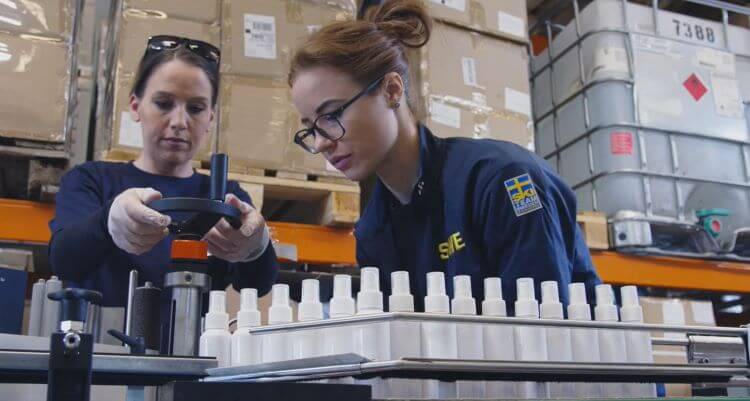WTCE spotlight: Hygiene of Sweden's disinfectants

Hygiene of Sweden's non-alcoholic products are adapted to skin and surfaces to be used daily without causing dry skin or damaged materials and instruments
Hygiene of Sweden is introducing a new standard of disinfection. The company provides effective disinfectants, clinically and dermatologically tested to ensure the best experience for all travellers.
The non-corrosive, non-flammable, long-lasting and recyclable products allow for a greener and safer option for travel hygiene. They will be on display at WTCE in Hamburg this June 6 to 8.

All products allow for custom branding, making it easier for airlines to make hygiene a part of their brand
The Problems with Alcohol-Based Disinfectants
In recent years, the importance of maintaining personal hygiene during air travel has become a top priority for both airlines and passengers. While alcohol-based disinfectants are widely used, their flammable nature and potential to damage materials make them less than ideal for the aviation industry.
Alcohol-based disinfectants are not suitable for the aviation industry for several reasons:
● Flammability: The flammable nature of alcohol-based disinfectants poses a significant safety risk in an airplane cabin. With countless electrical components and limited ventilation, the risk of fire is a genuine concern.
● Material damage: Alcohol-based disinfectants can cause damage to various materials, including plastic, rubber, and leather. This can lead to wear and tear on airplane interiors, negatively impacting passenger comfort and safety.
● Environmental impact: The production and disposal of alcohol-based disinfectants can contribute to environmental pollution and resource depletion. This is an issue of increasing importance for both airlines and passengers committed to reducing their environmental footprint.
The Benefits of Non-Alcoholic Disinfectants
Given the limitations of alcohol-based disinfectants, non-alcoholic alternatives, such as the ones by Hygiene of Sweden, offer numerous advantages for air travel:
● Safety: Non-alcoholic disinfectants are not flammable, making them a safer choice for use in the airplane cabin. This reduces the risk of fire and ensures the well-being of all passengers and crew members.
● Material compatibility: These disinfectants are typically gentler on materials, allowing them to be used on a wide range of surfaces without causing damage. This helps maintain the integrity and the appearance of airplane interiors.
● Eco-friendliness: Non-alcoholic disinfectants often have a smaller environmental footprint, aligning with the increasing focus on sustainable air travel.
● Comfort: These disinfectants can be used daily without causing dry skin, allowing for a better experience for travellers
Case Study: Skyside
Skyside GmbH, an airline management company, recently transitioned to using non-alcoholic disinfectants provided by Hygiene of Sweden to ensure long-term protection for both passengers and crew. This strategic move was driven by the need for a safer, more eco-friendly solution that aligns with the company’s sustainability goals. By adopting Hygiene of Sweden’s advanced disinfectant technology, Skyside GmbH has significantly reduced the risk of viral transmission onboard, while also protecting airplane interiors from damage.
The successful implementation of this initiative has resulted in improved safety, hygiene, and overall passenger satisfaction, positioning Skyside GmbH as a pioneer in the industry’s shift towards sustainable air travel practices.

